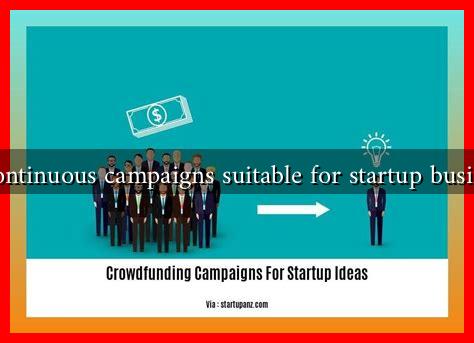-
Table of Contents
- Are Continuous Campaigns Suitable for Startup Businesses?
- Understanding Continuous Campaigns
- Advantages of Continuous Campaigns for Startups
- Challenges of Continuous Campaigns for Startups
- Case Studies: Successful Continuous Campaigns
- Statistics Supporting Continuous Campaigns
- Conclusion: Are Continuous Campaigns Right for Your Startup?
Are Continuous Campaigns Suitable for Startup Businesses?
In the fast-paced world of startups, marketing strategies can make or break a business. One approach that has gained traction is the concept of continuous campaigns. But are these campaigns suitable for startups? This article delves into the advantages and challenges of continuous campaigns, providing insights and examples to help entrepreneurs make informed decisions.
Understanding Continuous Campaigns
Continuous campaigns are marketing efforts that run over an extended period, often without a defined end date. Unlike traditional campaigns that are time-bound and focused on specific events or promotions, continuous campaigns aim to maintain a consistent presence in the market. This approach can include various marketing channels, such as social media, email marketing, and content marketing.
Advantages of Continuous Campaigns for Startups
For startups, continuous campaigns can offer several benefits:
- Brand Awareness: Continuous campaigns help build brand recognition over time. By consistently engaging with potential customers, startups can establish themselves in the market.
- Customer Relationships: Ongoing communication fosters relationships with customers. Startups can use continuous campaigns to gather feedback, respond to inquiries, and create a loyal customer base.
- Cost-Effectiveness: While startups often operate on tight budgets, continuous campaigns can be more cost-effective than launching multiple short-term campaigns. By spreading costs over time, startups can allocate resources more efficiently.
- Data-Driven Insights: Continuous campaigns allow startups to collect data over time, enabling them to analyze customer behavior and preferences. This information can inform future marketing strategies.
Challenges of Continuous Campaigns for Startups
Despite the advantages, continuous campaigns also present challenges that startups must consider:
- Resource Allocation: Startups often have limited resources. Continuous campaigns require ongoing investment in time, money, and personnel, which can strain small teams.
- Content Fatigue: Maintaining a continuous campaign can lead to content fatigue among audiences. Startups must ensure that their messaging remains fresh and engaging to avoid losing interest.
- Measurement Difficulties: Evaluating the success of continuous campaigns can be complex. Startups need to establish clear metrics and KPIs to assess performance effectively.
Case Studies: Successful Continuous Campaigns
Several startups have successfully implemented continuous campaigns, demonstrating their potential effectiveness:
- Buffer: The social media management platform Buffer has utilized continuous content marketing through its blog and social media channels. By consistently providing valuable insights and tips, Buffer has built a loyal following and established itself as an authority in the industry.
- Mailchimp: Mailchimp’s continuous email marketing campaigns keep users engaged with personalized content and updates. Their approach has helped them grow from a small startup to a leading email marketing service.
Statistics Supporting Continuous Campaigns
Research supports the effectiveness of continuous campaigns:
- A study by HubSpot found that companies that prioritize blogging are 13 times more likely to see a positive ROI.
- According to a report by Content Marketing Institute, 70% of marketers say that continuous content marketing is more effective than traditional advertising.
Conclusion: Are Continuous Campaigns Right for Your Startup?
In conclusion, continuous campaigns can be a powerful tool for startups looking to build brand awareness and foster customer relationships. However, they come with challenges that require careful consideration. Startups must assess their resources, audience engagement strategies, and measurement capabilities before committing to a continuous campaign approach.
Ultimately, the decision should align with the startup’s goals, target audience, and market dynamics. By weighing the pros and cons and learning from successful case studies, entrepreneurs can determine whether continuous campaigns are the right fit for their business. For more insights on marketing strategies for startups, consider exploring resources from HubSpot and Content Marketing Institute.

